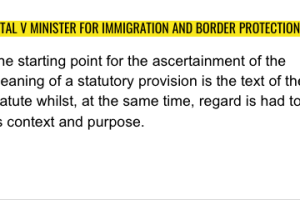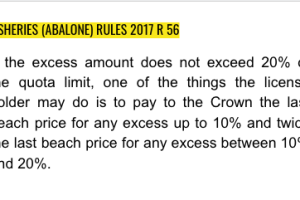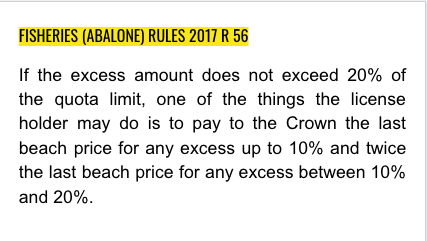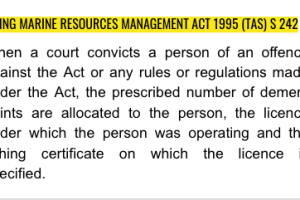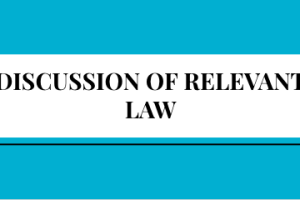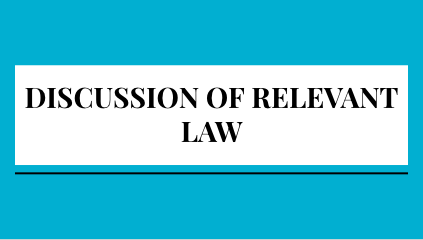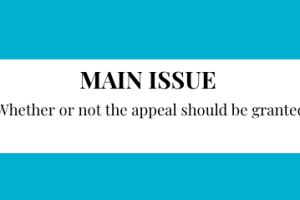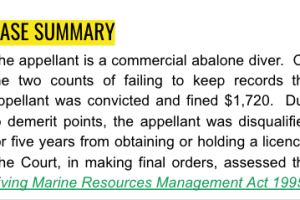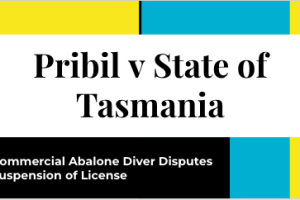Commercial Abalone Diver Disputes Suspension of License
Pribil v State of Tasmania [2022] TASSC 41 (21 June 2022)

The appellant is a commercial abalone diver. On the two counts of failing to keep records the appellant was convicted and fined $1,720. Due to demerit points, the appellant was disqualified for five years from obtaining or holding a licence. The Court, in making final orders, assessed the Living Marine Resources Management Act 1995.


Facts:
The appellant is a commercial abalone diver. He was a person authorised under s 89 of the Living Marine Resources Management Act 1995, called a supervisor, to use a fishing licence (abalone dive) issued to and held by another person, a company, under that Act, s 78, and the Fisheries (Abalone) Rules 2017, r 12. On 5 October 2021, the appellant pleaded guilty in the Court of Petty Sessions to two counts of failing to keep records in breach of the Act, s 145(1), and one count of taking an amount of abalone which exceeded the total amount specified in his licence at the time contrary to the Rules, r 15(3). The fishing licence and fishing certificate the appellant used for the relevant fishery, valid for the period 14 January 2020 to 31 December 2020, specified eight abalone quota units. Each quota authorised the taking of 24 kilograms of live green lip abalone, a total of 192 kilograms.
In previous years four additional quotas were specified in the appellant's licence, authorising the taking of an additional 96 kilograms. Those additional quotas, owned by other persons, were also available to the appellant for use during 2020 but, by oversight, he forgot to include them in the administrative licensing documents completed at the commencement of that year. As a result, he mistakenly assumed that the total amount of abalone he was authorised by his licence to take was 288 kilograms. Believing his total entitlement was 288 kilograms the appellant transferred an excess of 15 kilograms to another commercial licence holder, as he otherwise would have been entitled to do in accordance with the Rules, r 56(2)(a).
Again, the appellant correctly completed all of the required recordings and reporting documentation except that he was wrong about his total quota entitlement. In the dive docket, he recorded that his quota balance on that day was 151 kilograms when in fact it was 55 kilograms. The appellant's error in the total quota recorded in each of the dive dockets he signed was the basis of the two counts of failing to keep records under s 145. The defendant elected to pay double the beach price for the 30 percent overcatch in accordance with r 57 of the Fisheries (Abalone) Rules 2017.
The magistrate proceeded to sentence on the basis that the relevant quantity of abalone taken in excess of the appellant's authority was thereby 94.5 kilograms. Counsel for the respondent contended that the appellant's quota limit "on that day", referring to 10 July 2020, was 55 kilograms and that weight was the balance of the appellant's quota limit. Thirty percent of 55 kilograms amounts to 16.5 kilograms, although that was not the calculation given to the magistrate. The respondent's contention is that the appellant's quota limit on 10 July 2020 was 55 kilograms, because that was the balance of his licence entitlement at that time.
On the two counts of failing to keep records the appellant was convicted but no further order was made. For taking an amount of abalone which exceeded the total amount specified in his licence, the appellant was convicted and fined $1,720. On 25 November 2021, an officer of the Marine Resources Division of the Department of Primary Industries, Parks Water and Environment wrote to the appellant informing him that 206 demerit points had been allocated to him, and to his licences and certificates. The appellant was thereby disqualified for five years from obtaining or holding a licence because he was a person to whom "200 or more demerit points have been allocated in any 5-year period."

Issue:
Whether or not the appeal should be granted.

Applicable law:
Living Marine Resources Management Act 1995 (Tas) s 242 - provides that when a court convicts a person of an offence against the Act or any rules or regulations made under the Act, the prescribed number of demerit points are allocated to the person, the licence under which the person was operating and the fishing certificate on which the licence is specified.

Fisheries (Abalone) Rules 2017 r 56 - provides that if the excess amount does not exceed 20% of the quota limit, one of the things the license holder may do is to pay to the Crown the last beach price for any excess up to 10% and twice the last beach price for any excess between 10% and 20%.

Fisheries (Abalone) Rules 2017 r 57 - relevantly applies if the holder of the licence "takes on a fishing trip an amount of abalone that exceeds the licence holder's quota limit by more than 20% but not more than 30%."
Fisheries (Abalone) Rules 2017 r 58 - applies when the excess abalone taken on a fishing trip is more than 30% above quota limit.
Acts Interpretation Act 1931 s 8A - provides that "an interpretation that promotes the purpose or object of the Act is to be preferred to an interpretation that does not promote the purpose or object."
SZTAL v Minister for Immigration and Border Protection [2017] HCA 34, 262 CLR 362 - provides that the starting point for the ascertainment of the meaning of a statutory provision is the text of the statute whilst, at the same time, regard is had to its context and purpose.

R v A2 [2019] HCA 35; 269 CLR 507 - provides that the Act is an Act to promote the sustainable management of living marine resources, to provide for management plans relating to fish resources, to protect marine habitats.
Analysis:
After considering the text, context and purpose of the legislation, his Honour concluded that "a construction of the demerit point provisions which would implement a ban on the [appellant] is consistent with the general purpose of the Act and the particular provisions of Division 6 of Part 9.
The words "a particular time" in the definition of "quota entitlement" should be read as referring to the period during which the licence is in force, not the balance on a particular day. Otherwise, the rules would apply in a way that creates considerable inconsistency and unfairness.
If the respondent's interpretation were correct, a person who took all of a hypothetical total quota entitlement of 100 kilograms on a single day could resort to over catch provisions for up to 30 kilograms. However, a person with the same 100-kilogram quota entitlement, who took the last 10 kilograms on a separate day, could resort to the over catch provisions for only 3 kilograms.
The rules, or terms of the licence, do not impose a daily catch limit, or impose a limit, other than the total quota limit, on what may be taken on a particular fishing trip. Rule 58 entitled the appellant to elect to pay twice the last beach price for 30% in excess of the quota limit.
His quota limit was 192 kilograms, 30% of which was 57.6 kilograms. If the sum were paid, he committed no offence in relation to that 57.6 kilograms. The amount of the excess for which he was liable to be prosecuted would therefore have been 53.4 kilograms, not 94.5 kilograms as the magistrate was told.
The purposive considerations applied by the magistrate, and which are now advanced by the respondent, cannot, of course, justify an interpretation of the terms of ss 242 and 267 which the ordinary and literal meaning of the words of the sections cannot bear. The interpretation contended for by the respondent and applied by the magistrate, more accurately advances the context, object, and the purpose of the legislative scheme.
It is not a construction that seeks to fill perceived gaps in the legislation or which is too much at variance with the language in fact used by the legislature. The calculation of demerit points involves division of the amount of a fine by the current amount of a penalty unit, in circumstances in which the result may not be a precise number.
Conclusion:
The magistrate was correct to conclude that the fine of $1,720 imposed on the appellant attracted demerit points because it was the equivalent of 10 penalty units. The magistrate was also correct to conclude that the special penalty imposed on the appellant attracted demerit points as calculated by the respondent even though it was based on the weight and value of the fish.

